ABRAHAM DELIVERS LOT
Lot lived in Sodom and was taken captive. The reason this war is significant to the record here is that it reveals what Abram is going to do in connection with his nephew.
Genesis 14:1–16 is an action-packed story of war between ancient city-states. Four kings from the east arrive to put down a rebellion by five kings from cities around the Dead Sea.
After defeating them, the eastern kings loot Sodom, carrying off Abram’s nephew Lot and all he owns in the process. Abram gathers his own small army, along with three Amorite allies, and gives chase.
They catch the enemy in the northern reaches of Canaan, defeat them, and recapture all the plunder, including Lot.
Genesis 14:13-20 KJV
[13] And there came one that had escaped, and told Abram the Hebrew; for he dwelt in the plain of Mamre the Amorite, brother of Eshcol, and brother of Aner: and these were confederate with Abram.
[14] And when Abram heard that his brother was taken captive, he armed his trained servants, born in his own house, three hundred and eighteen, and pursued them unto Dan.
[15] And he divided himself against them, he and his servants, by night, and smote them, and pursued them unto Hobah, which is on the left hand of Damascus.
[16] And he brought back all the goods, and also brought again his brother Lot, and his goods, and the women also, and the people.
[17] And the king of Sodom went out to meet him after his return from the slaughter of Chedorlaomer, and of the kings that were with him, at the valley of Shaveh, which is the king’s dale.
[18] And Melchizedek king of Salem brought forth bread and wine: and he was the priest of the most high God.
[19] And he blessed him, and said, Blessed be Abram of the most high God, possessor of heaven and earth:
[20] And blessed be the most high God, which hath delivered thine enemies into thy hand. And he gave him tithes of all.
Genesis 14:13
And there came one that had escaped, and told Abram the Hebrew; for he dwelt in the plain of Mamre the Amorite, brother of Eshcol, and brother of Aner: and these were confederate with Abram.
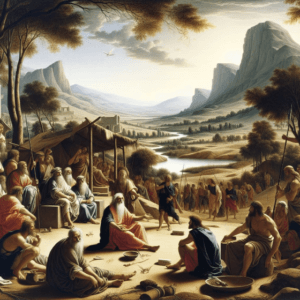 When the kings of the east left the area of Sodom and Gomorrah with their captives, they moved north along the west bank of the Dead Sea, which was not too far from Hebron and Mamre where Abram was dwelling.
When the kings of the east left the area of Sodom and Gomorrah with their captives, they moved north along the west bank of the Dead Sea, which was not too far from Hebron and Mamre where Abram was dwelling.
You can stand where Abram stood in that day and see any movement that takes place down toward the Dead Sea.
So that when word was brought to Abram, he immediately began to pursue the enemy as he moved north. “And these were confederate with Abram.” Notice that Abram has a group of men that are with him.
They had to stand together in that day because of the pursuit or the approach of an enemy. They either had to hang together or hang separately.
Lot and all he owns has been taken by a powerful military force from the east led by the king of Elam, Chedorlaomer.
Lot was scooped up along with all of Sodom’s and Gomorrah’s possessions and provisions after Chedorlaomer’s forces had defeated them in battle.
Lot, it seems, has quickly gone from choosing to live in the region of Sodom (Genesis 13:10), to living very near Sodom (Genesis 13:12), to actually living in Sodom (Genesis 14:11–12; Genesis 19:1).
This, despite its reputation for depravity (Genesis 13:13).
Now Abram learns from a survivor of that battle of Lot’s capture. Abram is referred to here as a Hebrew, the first use of this term in the Bible.
This was, apparently, the name for a particular kind of outsider in Canaanite society. Abram is still living near Hebron, near the oaks (or large trees) on land owned by an Amorite named Mamre.
Abram and Mamre are called allies, along with two of Mamre’s brothers.
Genesis 14:14
And when Abram heard that his brother was taken captive, he armed his trained servants, born in his own house, three hundred and eighteen, and pursued them unto Dan.
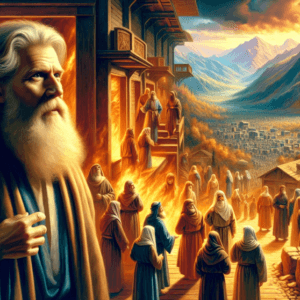
- This is startling, and it reveals something of the extent of Abram’s possessions.
- This gives you some conception of the number of servants Abram had.
- In his own household, he could arm 318.
How many did he have that he could not arm?
For instance, there would also be women and children and the old folk—but he could arm 318.
To have that many hired hands indicates that Abram was carrying on quite a business of raising cattle and sheep. “And pursued them unto Dan”—Dan is up in the north.
After learning that Lot has been taken captive by the forces of Chedorlaomer and the kings from the east, Abram immediately takes action.
He gathers 318 of his most reliable trained men, servants born and raised in his household.
That number provides a glimpse of how large Abram’s overall household must have been at this point, likely numbering well above 1,000 people.
A key point of context should be considered here. The “armies” of city-states of that era would have numbered in the thousands. These were not groups of tens or hundreds of thousands.
So, Abram’s forces were not chasing after a force outnumbering them hundreds-to-one. At the same time, the combined forces of four kings would have numbered significantly more than Abram’s allies.
And, Abram is himself more than seventy-five years old (Genesis 12:4)! So, this rescue operation is not only preparing for long odds, they are effectively rebelling against Chedorlaomer, themselves.
Abram and his men—and his three Amorite allies and their men—set out after Chedorlaomer’s army, chasing them all of the way to Dan, in the far northern reaches of Canaan.
Genesis 14:15
And he divided himself against them, he and his servants, by night, and smote them, and pursued them unto Hobah, which is on the left hand of Damascus.
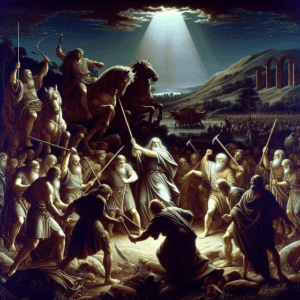 Abram pursued these men all the way north to Damascus—that is quite a stretch. Apparently, what Abram did was to divide his servants.
Abram pursued these men all the way north to Damascus—that is quite a stretch. Apparently, what Abram did was to divide his servants.
One group made an attack, probably from the rear as they were pursuing them. The other group went around, and when the enemy turned to fight the first group, the second group came down upon them.
As a result, Abram was able to get a victory. At least he was able to scatter them so that they fled across the desert, leaving the people and the booty they had captured.
After learning that Lot had been taken captive by the forces of Chedorlaomer and the kings from the east, Abram immediately gathered 318 of his most reliable trained men and began his pursuit of the departing armies.
Armies of the ancient world were significantly smaller than those of modern times. However, the combined forces of four kings, even after a campaign, would have been many, many times the size of Abram’s army.
Abram apparently caught up to them at Dan, in the northern reaches of the land of Canaan. Here, strategy helps Abram and his men overcome the numbers of their enemy.
Abram divides his men and attacks by night, defeating the enemy. They continue to chase the retreating eastern soldiers down as they flee farther north toward the ancient city of Damascus.
This is a strong contrast to Chederlaomer’s previous battle, which saw five kings literally fleeing from him in defeat (Genesis 14:10–11).
What a victory!
The four kings from the east had defeated multiple kings, city-states, and people groups in Canaan with apparent ease, never suffering any loss that we know of.
Clearly, they were a strong fighting force. Still, with God’s help, Abram and his personal army of 318 men and three Amorite allies defeats them in a single night.
God had promised to bless Abram, as well as to bless all who blessed him and curse all who dishonored him.
The mighty Chedorlaomer had dishonored Abram by taking his nephew (Genesis 14:12), and now God keeps His promise once again.
Genesis 14:16
And he brought back all the goods, and also brought again his brother Lot, and his goods, and the women also, and the people.
 Abraham had little interest in the happenings, had it not been for Lot. He hears that Lot has been taken captive, and sets about to rescue him.
Abraham had little interest in the happenings, had it not been for Lot. He hears that Lot has been taken captive, and sets about to rescue him.
Concerning this, Mackintosh says: “The claims of a brother’s trouble are answered by the affections of a brother’s heart.
This is Divine. Genuine Faith, while it always renders us independent, never renders us indifferent. It will never wrap itself up in its fleece while a brother shivers in the cold.”
After learning of Lot’s capture by the forces of King Chedorlaomer, Abram and his 318 men and three Amorite allies chased them down, defeated them at Dan, and kept pursuing them until the battle was finished.
This was quite a victory, given that Abram’s men had taken on a force which had recently routed the armies of five kings, and sacked several cities.
Now Abram returns the victor with all of the spoils. Not only did he save Lot and his possessions, Abram recovered all the possessions of the people of Canaan, including those of the people of Sodom and Gomorrah.
By any measure, Abram’s actions were heroic. They were especially amazing for a man more than seventy-five years old (Genesis 12:4).
As a man of faith, Abram understood it was the Lord who made it possible, something he will make clear in the following verses.
Genesis 14:17
And the king of Sodom went out to meet him after his return from the slaughter of Chedorlaomer, and of the kings that were with him, at the valley of Shaveh, which is the king’s dale.
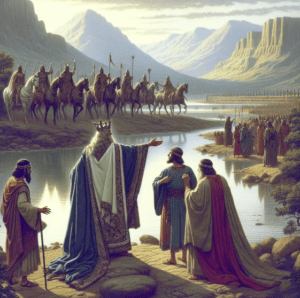 As we shall see here, there is no time so dangerous to the Christian as the morrow after a great spiritual victory.
As we shall see here, there is no time so dangerous to the Christian as the morrow after a great spiritual victory.
Abram returns now after his unlikely victory over the four kings from the east and their forces. With a fighting force of only 318 men, Abram has rescued his nephew Lot and Lot’s possessions.
In addition, he has reacquired all of the possessions and peoples taken by King Chedorlaomer after he defeated the kings of Sodom and Gomorrah and the rest of the city-states of Canaan.
Now Bera, the king of Sodom (Genesis 14:2), comes out to meet Abram at a place called the Valley of Shaveh or the King’s Valley.
After being soundly defeated by Chedorlaomer, Sodom’s king would have been interested in speaking with the man who just rescued his people and possessions.
The Bible indicates only that Bera went to speak with Abram, and gives us no other details on how or when they communicated prior to this moment.
The following verse will reveal that another king will join this gathering. What happens during this encounter will help shape many aspects of Judeo-Christian theology.
The meeting will be described in a back-and-forth style comparing the way Abram interacts with Bera, and how he interacts with this other, mysterious character.
Genesis 14:18
And Melchizedek king of Salem brought forth bread and wine: and he was the priest of the most high God.
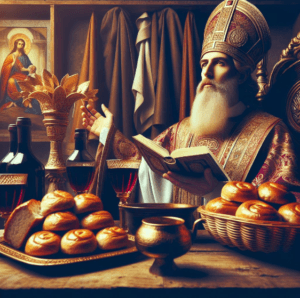 This man appears on the scene, who is a King and a Priest and, above all, who is a Type of Christ [Ps. 110:4; Heb. 5:5-6].
This man appears on the scene, who is a King and a Priest and, above all, who is a Type of Christ [Ps. 110:4; Heb. 5:5-6].
Some Scholars believe that Melchizedek could actually have been Shem, the son of Noah; Shem was alive at this time, and actually lived for about 60 years more.
In fact, some think he died when Abraham was about 150 years of age; his name means, “King of Righteousness” and “King of Peace” [Heb. 7:2]
The “bread and wine” symbolize the broken Body and shed Blood of our Lord, which was necessary for the Salvation of mankind [Mat. 26:29; Mk.,Chpt. 14; Lk. 22:15; Rom. 8:21]:
Melchizedek, as a Priest, symbolized the coming Christ, Who is our Great High Priest [Heb. 7:15-17].
David prophesied, about a thousand years after Abraham, “The Lord has sworn, and will not repent, You [Christ] are a Priest forever after the order of Melchizedek” [Ps. 110:4].
Abraham is here introduced to God by a different name than he had previously known, “El Elyon,” meaning “Most High God.”
As Abram returns from his defeat of mighty Chedorlaomer and the forces of the kings of the east, he brings with him Lot and all of Lot’s possessions.
Abram’s forces have also captured all of the possessions and peoples of Sodom and the other sacked Canaanite city-states.
In the previous verse, Bera, the king of Sodom (Genesis 14:2), has come out to meet Abram at a place called the Valley of Shaveh. Now another king joins them.
Melchizedek is a mysterious figure who is described as both the king of Salem and a priest of “God Most High.” He brings to conquering Abram a royal feast of bread and wine.
The king of Sodom, apparently, brought nothing worth mentioning to the meeting.
Many Bible scholars speculate that Melchizedek may be what is referred to as a theophany: the Lord taking human form for a specific purpose before His arrival on earth as Jesus.
Others suggest Melchizedek was merely a local king, faithful to God, sent by God to bless Abram. It’s even possible that Melchizedek was the king of Jerusalem, the future capital of Israel.
According to linguists, Salem might be a shortened version of the word that would become eventually become the name Jerusalem.
Either way, this figure will be monumental in our understanding of the ministry of Jesus Christ.
The writer of Hebrews quotes Psalm 110:4, in which Jesus is referred to as “a priest forever, in the order of Melchizedek” (Hebrews 5:6).
That writer also summarizes this moment in Genesis, pointing out that Melchizedek means “king of righteousness” and that “king of Salem” means “king of peace.”
The seventh chapter of Hebrews expands on these connections between Melchizedek and Jesus.
Genesis 14:19
And he blessed him, and said, Blessed be Abram of the most high God, possessor of heaven and earth:
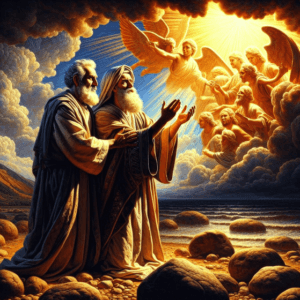 Melchizedek blessing Abraham means that the standing of Melchizedek was greater than that of Abraham. The reason? Melchizedek was a Type of Christ [Heb. 7:4, 7].
Melchizedek blessing Abraham means that the standing of Melchizedek was greater than that of Abraham. The reason? Melchizedek was a Type of Christ [Heb. 7:4, 7].
The blessing of verses 19 and 20 comes in a unique context. Two kings have come to meet Abram, who is returning from his victory over the four kings from the east.
This victory rescued his nephew, Lot, along with and all of the people and possessions of both Lot and Sodom in tow.
One of the visiting kings is Bera, the king of Sodom (Genesis 14:2). The other king is the enigmatic Melchizedek, the king of Salem and a priest of the “Most High God.”
Scholars present several possible identities for Melchizedek. One of these is that he was king of the city which would later become Jerusalem, based on the name Salem.
Another interpretation is that Melchizedek is a temporary, pre-Christ incarnation of God, known as a theophany or a Christophany.
After serving Abram bread and wine, Melchizedek offers a blessing. In blessing Abram, Melchizedek appeals to the God who made and owns all the earth and all the heavens.
Abram will acknowledge God’s possession of all things by giving, in the following verse, a tenth of the rescued plunder to God’s priest Melchizedek.
In doing so, Abram not only shows his growing humility, but also recognition that God does not speak to Abram, alone.
Genesis 14:20
And blessed be the most high God, which hath delivered thine enemies into thy hand. And he gave him tithes of all.
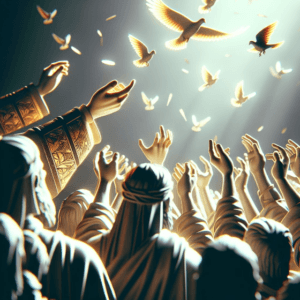 We find here that Melchizedek did not come forth when Abraham was in pursuit of Chedorlaomer, but when the king of Sodom was in pursuit of Abraham.
We find here that Melchizedek did not come forth when Abraham was in pursuit of Chedorlaomer, but when the king of Sodom was in pursuit of Abraham.
This makes a great moral difference. Mackintosh says: “A deeper character of communion was needed to meet the deeper character of conflict.”
This is the first time that “tithes” are mentioned in Scripture. It refers to a tenth part.
Abraham paid tithe to Melchizedek, who was a Type of Christ; consequently, Abraham’s children, which make up the Church presently, are to continue to pay tithe to those carrying out the Work of God.
Abram is returning from defeating the four kings of the east, in order to rescue his nephew Lot and all of Lot’s possessions.
In doing so, Abram has also recovered the plunder taken by the enemy, including all that was taken from Sodom.
Bera, the king of Sodom (Genesis 14:2), has come out to meet Abram, as has the king of Salem: a mysterious figure called Melchizedek.
Here, King Melchizedek, priest of the Most High God, continues his blessing for conquering Abram begun in the previous verse.
The blessing given states clearly that the Lord was responsible for this victory, something Abram was clearly already aware of.
Abram responds by tithing on the plunder he has recovered from the four kings of the east. He gives ten percent of all of it to this priest of God, Melchizedek.
This may have been a customary response to a blessing at this time, but it certainly would not have been required of Abram.
As the victor, the spoils of war would likely have been his to claim. He chose not to keep them.
This act of tithing will also serve as an example to Israel and God’s people in the future.
Tithing to the priests will become required by God’s Law (see Numbers 18; Leviticus 27:30-33).
I hope that you have really enjoyed this post,
Please Leave All Comments in the Comment Box Below ↓

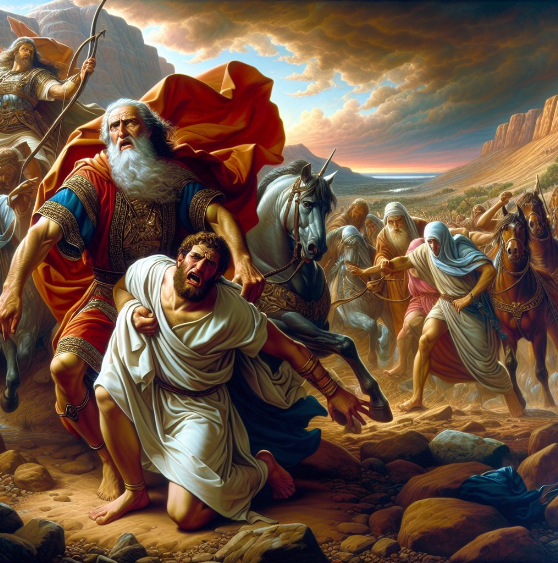











The account of Abraham’s heroic rescue of his nephew Lot from the hands of Chedorlaomer and the eastern kings is truly captivating.
The detailed description of the battles and strategic maneuvers adds depth to the story, showcasing Abraham’s determination and courage. The introduction of Melchizedek, the enigmatic king of Salem and priest of the Most High God, adds an intriguing spiritual dimension to the narrative.
The exchange of blessings between Melchizedek and Abraham emphasizes the role of divine intervention in the victory. The act of tithing, demonstrated by Abraham giving ten percent of the recovered spoils to Melchizedek, underscores his acknowledgment of God’s providence and ownership.
This story is a testament to Abraham’s faith, resilience, and the mysterious ways in which God’s plans unfold in unexpected situations.
Hello again Ashley,
As always, thank you for continuing to be a part of this HBS & DwJ Platform.
Please feel free to continue to stop by and share your thoughts on other information on this HBS & DwJ website anytime, your perspective is definitely welcomed.
I am also thankful that it peaks your interest at all. Please take the time to visit the podcast, and the store as well.
Your opinion on this topic, as well as the others you commented on, is very much appreciated.
Blessings To You My Friend!
Thank you for sharing this detailed exploration of Genesis 14:1-20, which tells the story of Abram’s rescue of his nephew Lot and his encounter with Melchizedek, the priest of the Most High God. This biblical passage is rich in symbolism and spiritual significance, and your commentary provides valuable insights into its context and meaning.
It’s fascinating to see how Melchizedek, as both a king and a priest, is considered a type of Christ in the Bible. His appearance and blessing add depth to the narrative and foreshadow the role of Jesus as our High Priest.
Your emphasis on the act of tithing as an example set by Abram is also noteworthy. Tithing remains a significant practice in many religious traditions and serves as a way of acknowledging God’s provision and giving back to Him.
Overall, your commentary adds depth and understanding to this biblical passage, making it more accessible and meaningful for readers. Thank you for sharing your insights and reflections on this ancient text.
Hello Demi Foster,
Thank you for continuing to stop by, adding value to this HBS & DwJ Platform.
Your opinion on this topic, as well as all of the others you comment on, is very much appreciated.
Blessings To You My Friend!
Hi Sir,
This post provides an insightful analysis of the biblical account of Abraham’s rescue of Lot and his encounter with Melchizedek. It highlights the significance of Melchizedek as a type of Christ and explores the concept of tithing, which is mentioned for the first time in the Bible in this context.
Question: How does this biblical account of Abraham and Melchizedek relate to the broader themes of faith and obedience in the Bible, and what lessons can modern readers draw from it in their own lives?
I’m curious to read your response…
Hello Claude,
Welcome to the HBS & DwJ Platform.
Melchizedek is a mysterious figure mentioned in the Bible who appears briefly but leaves a lasting impact on readers. Despite his brief appearance, numerous questions arise about his identity and significance.
Melchizedek is the only person in the Bible who is both a king and a priest. This dual role makes him a unique figure in biblical history. The encounter between Melchizedek and Abraham is significant because it predates the establishment of the Levitical priesthood, making Melchizedek’s priesthood independent of the Jewish religious system.
Melchizedek’s offering of bread and wine to Abraham foreshadows the institution of the Lord’s Supper by Jesus during the Last Supper, where bread represents his body and wine represents his blood. The author of Hebrews uses Melchizedek as an example to demonstrate how Jesus’ priesthood is superior to the Levitical priesthood because it is eternal, unchanging, and not based on lineage.
Melchizedek’s lack of recorded genealogy in the Bible has led some scholars to speculate that he was an Old Testament appearance of Christ.
Thank you for stopping by, as well as your interest in this platform,
Blessings My Friend!!!
The content of this article is interesting, especially the story of Abraham.
His story of faith and resilience does show that human kind can achieve the impossible through faith. I could use this story as a reminder for myself.
Could you please go over the meaning of the word tithes?
That word was mentioned in the article a few times, especially in the biblical quotes.
Hello Anshu,
Thank you for your comment on this Abraham Delivers Lot – A Pursuit Unto Dan episode.
The word tithe literally means tenth in Hebrew. A tithe is a 10% portion of your income given as an offering to your local church. The Bible explains that tithing is an important part of faith for those who follow God and that your tithe should be money you set aside first.
Please come back and visit this website, the podcast, and the store anytime.
Thanks again for your time,
Blessings My Friend!
I often study this passage for various reasons.. the 2 main reasons are the significance of tithing and the demonstration of Abram’s faith and response to God’s intervention in his life.
It also lays the groundwork for future biblical themes and concepts. Thank you for this. I may bring this up during Sunday school discussion.
Hello Thomas,
Thank you for taking the time to stop by and comment, as well as considering this a subject to bring up during your Sunday school discussion.
Feel free to listen to the HBS & DwJ Podcast on iHeart, Apple Podcast, YouTube, or where-ever you get your podcast.
Blessings My Friend!